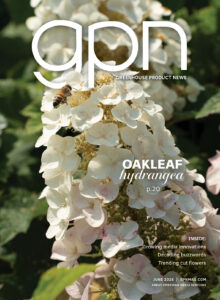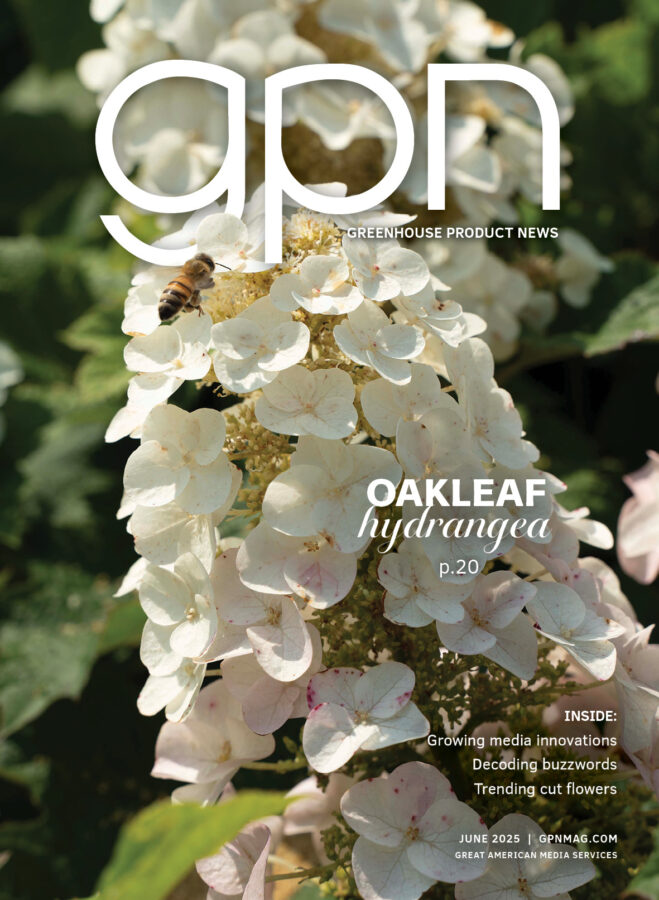Why Horticulture Should Be Recycling
To say I’m passionate about recycling would be an understatement. So it was a natural and pleasing moment to discover that my family’s company could not only provide growers solutions to their operational challenges but also increase the industry’s sustainability.
The plant industry faces a big challenge with recycling plastic containers. Despite being a “green” industry, we produce an incredible amount of plastic waste. And we don’t have a good full-circle reuse plan.
Recycling Challenges

Many flower pots contain no recycled material and cannot be recycled, meaning they end up contributing to the tons of plastic waste generated in the United States every day — and worsening the country’s oil dependence. More than 2.2 billion water bottles are thrown away each year, and one water bottle can take up to 1,000 years to break down in a landfill.
Some curbside recycling programs cannot accept plastic plant containers including trays, pots and hanging baskets. They’re most often made of plastics such as #2 (high density polyethylene), #5 (polypropylene) and #6 (polystyrene). These categories are more expensive and more difficult to recycle, so demand for them fluctuates. While we’re seeing more curbside recycling programs add these numbers to their list of acceptable plastics, it’s still not the norm.
The difficulty in recycling our industry’s containers creates a dilemma because consumers want recycling to be easy. In fact, one survey found that nine out of 10 people would recycle more if it was easier. Considering that most people who recycle do so from home (72 percent) and about half of those use curbside recycling, and it’s easy to see convenience is key.
Finding a Solution
Currently, many retailers ask consumers to return containers to the store. Then growers have to pick them up, take them to their own facility, clean them, sort them and then provide them to a recycler. This is not only very labor intensive for growers (who do not have the expensive automated technology for recycling), but it yields very low recycle rates, because very few consumers bring containers back to the store.
A better solution would be to have recycling companies process our containers instead of burdening growers. The best way to do this is to make containers made of plastic materials that curbside recyclers already process.
Americans use 2.5 million plastic water bottles every hour, and throw most of them away. They’re made from PET, or polyethylene terephthalate, a thermoplastic polymer resin. Look at the bottom of the bottle, and you’ll see the #1 recycling symbol.
PET is accepted by a higher percentage of municipalities than any other type of plastic, and recyclers know how to sort them and clean PET containers, which is necessary to reuse the material. Consumers can simply drop them at their curbside program.
That’s why McConkey is making rEarth containers, made from recycled water bottles. It’s tear resistant and cost neutral to traditional plastic. At our Sumner, Washington, manufacturing plant, we recycle nearly 100 million water bottles each year on two production lines. The ratio is about 1:1 — approximately one 16.9-ounce water bottle makes one rEarth pot. Producing rEarth containers takes about 60 percent less energy than container production using virgin plastic.
Making rEarth from water bottles means the containers are curbside recyclable — a win for growers, retailers and gardeners. It gives our industry a viable full-circle reuse program and is easier for consumers and lower cost for growers, who no longer have to process it.
Nearly two-thirds of Americans recycle on a regular basis — and half of Americans say they recycle 75 percent or more of their recyclable items. That’s up from 34.5 percent in 2012. The message is clear: Our customers want to recycle. Reduce, reuse, recycle. It’s our industry’s responsibility to make it easier.









 Video Library
Video Library 


















